Queer Lives: Narrations of Work Abroad (June 3)

It is truly a joy to wake up in Bandra.
The window is cracked slightly, just enough to let in the sounds of mid-morning – car horns echoing through the road, some unknown bird serenading the early sunshine, the dulled clatter around the house. I’ve always preferred night to morning, happy to sit out by the window well past midnight, but I take a few moments now to enjoy the space in between waking and rising.
Of course, I do eventually have to get out of bed. It’s my first full day in the city, and I’m finally meant to be meeting with my supervisor in person. Rubbing the last bits of sleep from my eyes, I pad out to the living room and curl up on the couch with a cup of chai. And oh – this living room! It’s surely my favourite place in the house, with massive windows on either side of the room. Wind flows through like a dialogue between them, catching us in the conversation. From here, perched on the arm of a sky-blue sofa, I can watch the sun climb out over the rooftops, hear the faraway shouts of workers below.
Breakfast itself is a lively affair. Steaming plates of upma and chutney lay out on the far edge of the table. Asok Uncle, while packing a bag for his week away, tries to teach me about the stock market, while Revathi Auntie paces through the house searching for a lost item or two. I, sat cross-legged through the bustle, watch the house come to life as I sip my tea and eat a frankly obscene amount of pomegranate, lychee, and blood-red cherries. I am happy to bear witness to the scene, and to let the minutes slip through like the rains pass through the trees.
Today, the real work starts, and to be honest, I’m scared beyond measure. This project has been in the works for months now, and I’ve spent the last few weeks drawing out schedule after schedule, plan after plan, sending out emails and organising video calls and trying my absolute best to get a handle on a situation that seems determined to elude me. But finally, now, I’m here, and I feel completely unprepared for what will await me in the office. The primary issue I had with my research in India last year was uneven communication, and it’s an issue I still face, to some extent. Although my supervisor has been extremely easy to reach, I’ve found that people in general here make plans once all feet are on the ground, so to speak. Although the two of us have had multiple calls, and he’s been the very patient recipient of numerous Word documents, the whole project still feels very up in the air. Land, he had told me, and it’ll figure itself out – nerve-wracking words to my overthinking, obsessively stressed brain.
I breathe deeply, stretching out my clenched hands. One step at a time, as all things are. First, I have to make it to the office. After a quick shower and a hurried goodbye to Asok Uncle – he's running late, and traffic will get only worse through the day – I open my phone to call a taxi. Entering the address my supervisor sent me, I hit submit and wait for the confirmation to pop up on my screen.
Except it doesn’t. Another ten minutes pass, and nothing changes: the loading bar seems stuck in place, zooming in and out over the grey-toned map. Every driver that responds cancels within seconds, and after twenty minutes of waiting, it becomes clear that none are going to accept the request. Never fear, though, because Revathi Auntie, as usual, comes to my rescue. It’s time, she decides, that I learn the city like a local. If I’m going to be spending a month here, I need to know how to navigate without the convenience of a well-timed car service, and right now, that means finding an auto.
Autos, or autorickshaws, are quite literally everywhere in the city. Three-wheeled and bright yellow, they zip through the roads like oddly shaped Tetris pieces, squeezing into the narrowest gaps and scaring the daylights out of unpractised pedestrians such as myself. They’re also incredibly convenient, and as Revathi Auntie and I sit, knees tight against each other, and race through the crowded roads, I get a view of Mumbai that would be hard to find otherwise. The auto is low to the ground, placing me at eye level with everyone walking on the street. I watch a child dancing in the light drizzle, his mother buying fruit at a local produce stall. A few metres away, two businessmen drink from paper white cups – a midday coffee, most likely, in the fleeting moments between meetings. And of course, next to me, Revathi Auntie sits, her hands folded across her lap, telling me about her favourite parts of the city. The clothes shop we just passed – I'll like that one, she thinks – or maybe the bakery a few streets down. This, and that, and one more thing!
We reach the building after a thirty-minute ride, and I hop down onto the busy street, waving bye to Revathi Auntie. I’m a bit confused at first; the building has no visible entrance, but I’m only left standing lost for a few moments before someone directs me around the side. The offices of the organisation I’m working with, the Humsafar Trust, are on the ninth floor, so I slip into the elevator and spend a few seconds frantically trying to fix my hair in the mirror. Before I can do much, though, the lift dings, and I step out into a clinically-white hallway.
My supervisor opens the door for me, and I head inside gratefully. Turning the corner, I’m introduced to a member of the Research team, who I’m told will be my personal mentor. I immediately warm to them: they’re soft-spoken and always have a slight smile on their face which I can’t help but return. We take a seat in one of the meeting rooms to run through my plan – the meeting itself is fairly quick, but we manage to narrow down a few elements of my proposal and figure out what work I’ll be able to best complete in the time I have here. My worries, it seems, were for nothing: the entire team runs smoothly, and I feel nothing but welcomed into the flow. My mentor gives me my first two projects: one, helping create a research matrix of academic studies that the Humsafar Trust have worked on, specifically on the prevalence of HIV and AIDS amongst Indian queer communities, and two, desigining a needs-based survey for outreach to queer female groups in the city. As it turns out, my work starts now, so I send Revathi Auntie a quick message that I won’t be on my way back for a while, take a seat at a free desk, and open my laptop.
In some way, I think research always stems from who you are. In my family, it’s certainly always been so. My amma, who is a neuroscientist, works on neurodegenerative diseases; my grandfather, her father, suffered for years from Alzheimer’s disease. My best friend, who grew up building and crafting with his grandfather, now studies mechanical engineering. For me, this work is fundamental, down to my core, and I’m beyond appreciative for the chance to be part of an organisation like Humsafar. It’s a joy not only to contribute towards representing and supporting a community I am part of, but also to meet other queer South Asian people. It’s a meeting place for identity, a table around which parts of myself can settle over a pot of tea and a conversation. I feel, almost instantly, at home.
I stay at the office for a few hours, until the sun starts to set. I figure I should get back home before it gets dark, so bidding my farewells, I call a taxi and try not to doze off during the long drive back to Bandra. By the time we reach, though, I’m awake again – and good I am, because as soon as I step foot inside, I’m out the door again. Revathi Auntie wants to take me to a new store that’s opened in town, so we walk for about ten minutes before we reach a well-lit array of shops; in the middle sits a brightly coloured, almost Wes Anderson-esque storefront displaying what must be the most eclectic and inviting array of sweets that I’ve ever seen. I leave the shop with my mouth watering, delicately cradling a mango-matcha tiramisu in my hands.
The rest of the evening is simple: a slow dinner, and a lazy hour stretched out on the couch listening to music. I wrote earlier that night is one of my favourite parts of the day, and I’m reminded of why. There is a certain kind of peace, I think, in sitting quietly when everyone else has gone to bed. It feels as if the entire world is yours, if only for a few hours. And now, it is mine, until I bid it goodnight.
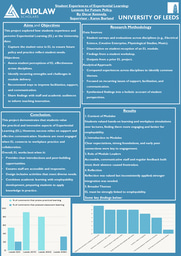
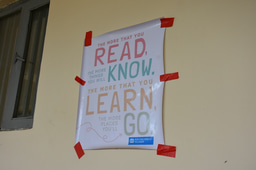
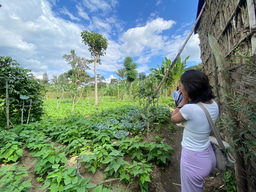
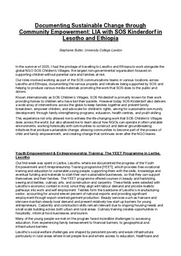
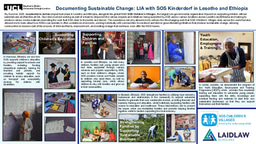
Please sign in
If you are a registered user on Laidlaw Scholars Network, please sign in